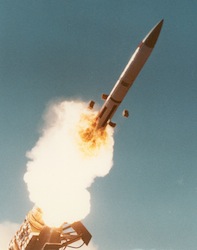Missile Defense Realism Needed in Washington and Moscow
June 7, 2011
Featured Image
Today's top nuclear policy stories, with excerpts in bullet form.
Stories we're following today: Tuesday, June 7, 2011.
The Missile Defense Hyperbole Game - By Greg Thielmann in The Moscow Times [link]
- If Presidents Dmitry Medvedev and Barack Obama show the necessary political will and leadership, it is still possible to provide mutual, written guarantees that any future strategic missile defense deployments will not be directed at the other. They can also develop a joint data fusion center on missile launches by third countries, such as Iran, that could pose a threat to Russia, Europe and perhaps the United States.
- Realism is very much needed from both sides in the delicate negotiations to achieve a level of U.S.-Russian cooperation on missile defenses. This will help Moscow and Washington address the mutual threat from emerging nuclear proliferators in the Middle East while satisfying Russia’s legitimate concerns about protecting the credibility of its nuclear deterrent.
Why Sanctions Against Iran Won't Work - By Reza Marashi in Salon [link]
- Sanctions are a tool that American policymakers know -- they know how to add them, change them, intensify them, push them through Congress, and negotiate them bilaterally and at the U.N...the logic of some in Congress (and the Obama administration) regarding what sanctions can achieve is largely misguided.
- Since its inception, the Islamic Republic has faced a steady stream of sanctions, isolation and conflict -- and Iranian hardliners perceive this as the environment in which they thrive. To that end, they have defied sanctions for over 30 years, take a certain pride in doing so, and are likely to continue doing both. Iran's ruling elite sees sanctions as the West resorting to a pressure-based formula that history has proved ineffective due to the lack of viable policy alternatives.
World Nuke Spending to Top $1 Trillion Per Decade - By Bruce Blair in Battleland [link]
- At this rate the nuclear-armed states will spend at least one trillion dollars on nukes over the next decade. It will likely go much higher as modernization programs across the board kick into high gear.
Nuclear Weapons Threat Not Decreasing, Study Says - AFP [link]
- "More than 5,000 nuclear weapons are deployed and ready for use, including nearly 2,000 that are kept in a high state of alert," according to a report by the Stockholm International Peace Research Institute (SIPRI).
- As of January 2011, Russia had 11,000 nuclear warheads, including 2,427 deployed, while the United States had 8,500 including 2,150 deployed, the report said.
US Should Dissuade Iran from Making Nukes: Study - By Jim Mannion in AFP [link]
- "There is still time to dissuade Iran from weaponizing its program," said Alireza Nader, one of the authors of the report, "Iran's Nuclear Future: Critical US Policy Choices."
- Calls for military strikes to take out Iran's nuclear capabilities have faded as the implications for the region have sunk in.
- "The bottom line from our point of view is -- shared by the intelligence community -- that Iran has yet to make a decision with respect to its nuclear program," [said Lynn Davis].
- With Iran now largely capable of developing a nuclear weapon, the goal of US policy should be to dissuade it from taking the fateful, next step of making a weapon, urged a study released Tuesday...And if it fails, the United States should have a strategy worked out to deter a nuclear armed Iran
A Former Spy Chief Questions the Judgment of Israeli Leaders - By Ethan Bronner in The New York Times [link]
- The man who ran Israel’s Mossad spy agency until January [Meir Dagan] contends that Israel’s top leaders lack judgment and that the anticipated pressures of international isolation as the Palestinians campaign for statehood could lead to rash decisions — like an airstrike on Iran.
- This week Mr. Dagan, speaking at Tel Aviv University, said that attacking Iran “would mean regional war, and in that case you would have given Iran the best possible reason to continue the nuclear program.” He added, “The regional challenge that Israel would face would be impossible.”
A Case of False Missile Defense Panic - By Michael Bohm in The Moscow Times [link]
- Since Russia’s military hawks view its nuclear weapons as the holy of holies — or, to put it more bluntly, the only military component that still makes it a superpower — even the slightest hint of a theoretical devaluation of Russia’s strategic forces from U.S. missile defense gets blown out of proportion and is viewed as a matter of life and death for the country’s national security, however irrational this may appear to outsiders.
- Russia’s military hawks, who constantly warn that U.S. missile defense will undermine Russia’s strategic nuclear deterrence, are experiencing a hallucination. We have been hearing these overblown, alarmist cries ever since President George W. Bush announced the U.S. withdrawal from the Anti-Ballistic Missile Treaty in December 2001.
- Medvedev also pressed for a written, binding U.S. guarantee that no missile defense system could ever be targeted against Russia. But a quick look at the globe will show that this proposal is a nonstarter at best and nonsensical at worst.



